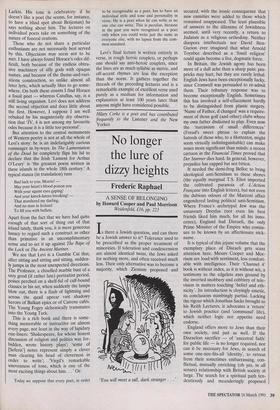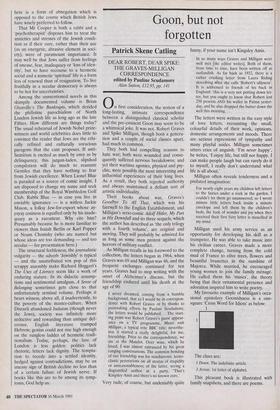No longer the lure of dizzy heights
Frederic Raphael
A SENSE OF BELONGING by Howard Cooper and Paul Morrison Weidenfeld, £16, pp. 223 Is there a Jewish question, and can there be a Jewish answer to it? Tolerance used to be prescribed as the proper treatment of minorities. If toleration and condescension are almost identical twins, the Jews asked for nothing more, and often received much less. Their only alternative was to become a majority, which Zionism proposed and You will meet a tall, dark stranger . ,
secured, with the ironic consequence that new enmities were added to those which remained unappeased. The least plausible of answers to the dilemma of Jewishness seemed, until very recently, a return to Judaism as a religious orthodoxy. Neither diaspora intellectuals nor David Ben- Gurion ever imagined that what Arnold Toynbee described as a 'fossil religion' could again become a live, dogmatic force.
In Britain, the Jewish agony has been more of a dull ache than a sharp pain: pin- pricks may hurt, but they are rarely lethal. English Jews have been exceptionally lucky, since Cromwell was persuaded to re-admit them. Their tributary response was to become exceptionally English. Sometimes this has involved a self-effacement hardly to be distinguished from plastic surgery. 'Name of Father, if changed' was a require- ment of those golf (and other) clubs where my own father disdained to play. Even now the 'narcissism of small differences' (Freud's sweet phrase to explain the hatreds of those who, to a Hottentot, might seem virtually indistinguishable) can make noses more significant than minds: a recent cartoon in the Financial Times proved that Der Stunner dies hard. In general, however, prejudice has yapped but not bitten.
It needed the demi-frog Belloc to bring ideological anti-Semitism to these shores (the equally marginal T.S. Eliot imported the cultivated paranoia of L'Action Frangaise into English letters), but not even the dubious odours of the Marconi affair engendered lasting political anti-Semitism. Where France's archetypal Jew was the unsavoury Dreyfus (not even his best friends liked him much, for all his inno- cence), England had Disraeli, the only Prime Minister of the Empire who contin- ues to be known by an affectionate nick- name.
It is typical of this jejune volume that the exemplary place of Disraeli gets scant attention here. Messrs Cooper and Mor- rison are loud with sentiment, less comfort- able with intelligence. Their 'Channel 4' book is without index, as it is without wit, a testimony to the edgeless axes ground by the inverted snobbery and cobblery of tele- vision in matters touching 'belief and eth- nicity'. Its introduction is cloyingly emetic, its conclusions numbingly partial. Lacking the rigour which Jonathan Sacks brought to his Reith Lectures, it advocates a 'return' to Jewish practice (and 'communal' life), which neither logic nor appetite need endorse.
England offers more to Jews than their own society, and just as well. If the Disraelian sacrifice — of 'ancestral faith' for public life — is no longer required, nor can it be necessary for Jews, in search of some one-size-fits-all 'identity', to • retreat from their sometimes embarrassing, con- flictual, mutually enriching (oh yes, in all senses) relationship with British society at large. The search for a spiritual path ten- dentiously and meanderingly proposed here is a form of abnegation which is opposed to the course which British Jews have wisely preferred to follow.
That Mr Cooper is both a rabbi and a 'psychotherapist' disposes him to treat the anxieties and stresses of the Jewish condi- tion as if their cure, rather than their use (as an energetic, abrasive element in soci- ety), were of paramount importance. It may well be that Jews suffer from feelings of unease, fear, inadequacy or 'loss of iden- tity', but to have recourse to a hermetic social and a mimetic 'spiritual' life is a form less of renewal than of resignation. To live fruitfully in a secular democracy is always to be hot for uncertainties.
Among the unmentioned novels in this skimpily documented volume is Brian Glanville's The Bankrupts, which derided the philistine parochialism of North London Jewish life as long ago as the late Fifties. How different are things today? The usual rehearsal of Jewish Nobel prize- winners and world celebrities does little to convince the reader that Jews are the ethi- cally refined and culturally voracious paragons that the cant proposes. If anti- Semitism is excited as much by envy as by delinquency, this jargon-laden, slipshod compilation will do Much to reassure Gentiles that they have nothing to fear from Jewish excellence. When Lionel Blue is paraded as a source of comic insight, I am disposed to change my name and seek membership of the Royal Wimbledon Golf Club. Rabbi Blue — in case you live in enviable ignorance — is a witless Jackie Mason, a folksy Jew-for-export whose ay- yayay cosiness is equalled only by his inade- quacy as a raconteur. Why cite him? Presumably because he is more familiar to viewers than Isaiah Berlin or Karl Popper or Noam Chomsky (who are named but whose ideas are too demanding — and too secular — for presentation here.) The structural feebleness, the journalistic vulgarity — the adverb 'Jewishly' is typical — and the unattributed vox pop of this scrappy assembly make Richard Hoggart's The Uses of Literacy seem like a work of enduring stature. In its didactic assump- tions and sentimental amalgam, A Sense of Belonging sometimes gets close to that unfortunately seminal volume. Perhaps it bears witness, above all, if inadvertently, to the poverty of the master-culture. When Disraeli abandoned Judaism (though never the Jews), society was infinitely more seductive and rewarding than antique def- erence. English literature trumped Hebrew; genius could not rise high enough on the rungless ladder of hermetic tradi- tionalism. Today, perhaps, the lure of London is less golden: politics lack rhetoric, letters lack dignity. The tempta- tion to recede into a settled identity, hedged against contradictions, may be an uneasy sign of British decline no less than of a certain failure of Jewish nerve. If books like this are to be among its symp- toms, God help us.



























































 Previous page
Previous page